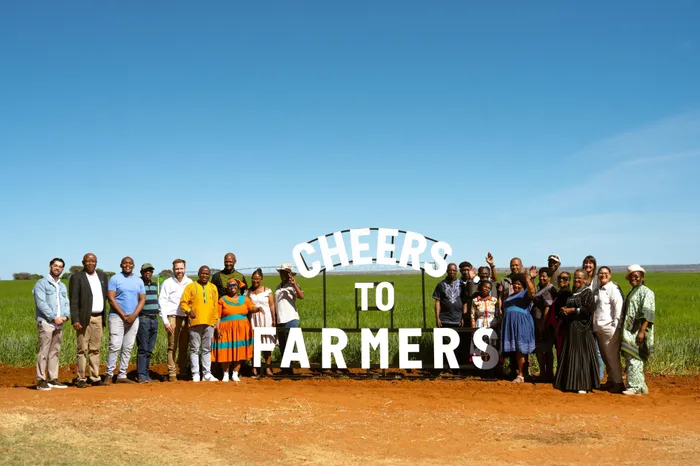SAB's investment in local farmers boosts South Africa's agricultural sector
AGRICULTURE

SA Breweries (SAB) held an event, “Cheers to Farmers,” in Rooiwal, Greater Taung Municipality, to celebrate the role of local farmers in powering the beer value chain.
Image: Supply
South Africa’s agricultural success rests on collaboration and innovation, said Dr Sifiso Ngqangweni, CEO of the National Agricultural Marketing Council (NAMC).
He spoke at an SA Breweries (SAB) “Cheers to Farmers” event in Rooiwal, Greater Taung Municipality, on Thursday, where the role of local farmers in powering the beer value chain was celebrated.
He said the long-term commitment to research and development that they had witnessed in Rooiwal, including the introduction of new barley varieties and advanced mechanisation support, was helping farmers to increase productivity while staying competitive in global markets.
SAB, maker of beers such as Castle Lager, Carling Black Label, and Flying Fish, has spent more than R650m on agricultural development in South Africa since 2018 in support of the ingredients for making beer.
The beer industry is deeply rooted in South Africa’s farming economy, contributing over R2.2 billion to agricultural GDP and supporting more than 38 000 jobs in agriculture nationwide.
SAB, which is owned by the global alcohol drinks and beverages group Anheuser-Busch InBev, invests in the local agricultural sector to ensure its beer is made from natural, local ingredients, while also supporting inclusive growth by empowering communities across the country.
This impact was brought to life at the “Cheers to Farmers” event, which highlighted how innovation, investment, and committed partnerships were shaping a sustainable agricultural sector that supports livelihoods and communities.
North West Premier Lazarus Mokgosi said the event showcased the effectiveness of partnerships among businesses, farmers, and the government.
“Here in Taung, we see what investment in agriculture really means: productive land, jobs for local households, and resilient communities. Farming is the foundation of our economy, and by supporting our farmers, we are also building a more inclusive and sustainable future for the North West Province,” he said.
The impact of SAB’s investment in Taung was vindicated by the farmers in the area delivering an impressive 17 400 tons of barley, with an average yield of 4.9 tons per hectare. This output was supported by R70m in loans and R16m in mechanisation support, co-funded by SAB and the South African Cultivar and Technology Agency.
With these resources, 80 farmers were able to service over 2 140 hectares of land, strengthening agricultural productivity in the region. In addition, the programme had created and sustained 292 jobs, both direct and seasonal, ensuring that the benefits reached households and communities across Taung.
“Beyond delivering tons of grain, our farmers are ensuring food security, economic growth, and opportunities for young people and women in agriculture,” said Dr Ngqangweni.
Aside from Taung, SAB has, over the past 7 years, invested more than R200m in research and development, opening Africa’s largest barley research facility in Caledon.
Partnerships worth more than R64m with international and local institutions had enabled the introduction of new barley varieties and the adoption of advanced farming techniques in the country. SAB had also pioneered the cultivation of nine unique hop varieties in the Western Cape, the only region in Africa where hops can be cultivated.
“At SAB, we are deeply committed to the farmers who make it possible for us to brew high-quality beer with natural ingredients grown right here in South Africa. For the past 130 years, the story of SAB and our industry is the story of these farmers; men and women who drive innovation in their fields, create jobs in their communities, and deliver crops that meet the highest standards,” said SAB’s CEO Richard Rivett-Carnac.
SAB’s agricultural programmes reach more than 500 farmers annually, with a focus on empowering women, youth, and developing farmers through skills training, funding, and access to markets. Partners such as FarmSol, NAMC, and provincial governments play a crucial role in creating an inclusive ecosystem that enables farmers to thrive.
BUSINESS REPORT